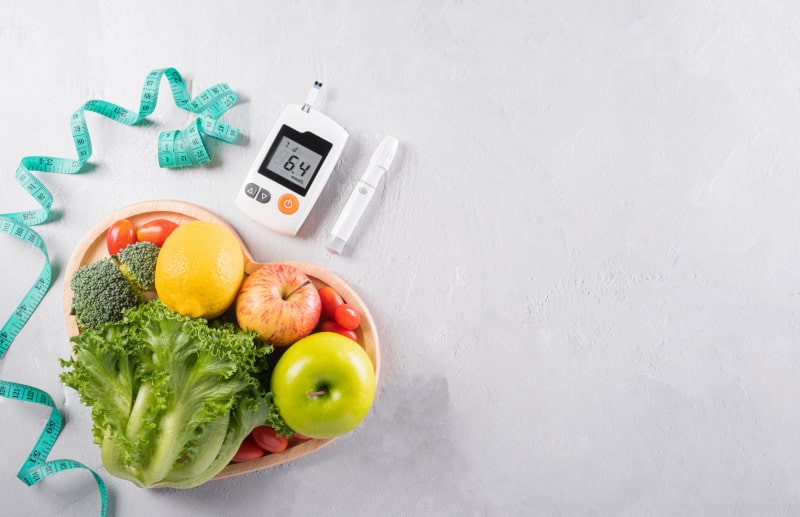A diet to lower blood sugar levels plays a key role in diabetes management . Diabetes affects blood glucose metabolism, and early detection is crucial to avoid complications.
The diagnosis of diabetes is based on fasting blood glucose measurements, and timely treatment can prevent long-term complications such as episodes of hyper or hypoglycemia, cardiovascular diseases, neurological problems, kidney and eye damage, and foot and mouth conditions, among others.
In today’s article, we focus on the importance of the diet to lower blood sugar levels in the context of diabetes, as well as the usefulness of our PlanEAT application, the Nutrition App, to guide you in this process.
Contenido
Diet to Lower Blood Sugar Levels: The 3 Types of Diabetes
Diabetes is a chronic disease that is on the rise in our society, so it is essential to adopt a healthy and adapted diet to prevent its development.

Some common symptoms of diabetes include unintentional weight loss, increased thirst and urinary frequency, blurred vision, presence of ketones in the urine, recurrent infections, fatigue, and mood changes.
A low-sugar diet is recommended, or at least the intake of appropriate foods that help maintain stable blood sugar levels , such as vegetables, fresh fruits, legumes, whole grains and lean proteins.
Avoiding excessive consumption of simple sugars and processed foods is key to maintaining adequate blood sugar control.
Types of Diabetes
There are several types of diabetes that require different approaches to management.
Type 1 Diabetes
Type 1 diabetes , for example, occurs at an early age and is characterized by a lack of insulin production in the body, which makes it insulin-dependent.
To control type 1 diabetes , it is essential to administer insulin doses regularly, adjusting them according to the amount of carbohydrates consumed at each meal.
A diet to lower blood sugar levels, along with physical activity and hydration , plays a crucial role in this process.
Type 2 Diabetes
Type 2 diabetes usually develops after the age of 45, although it is increasingly common at younger ages due to malnutrition in our daily lives. It is characterized by insufficient insulin production by the body.
To control type 2 diabetes, the importance of lifestyle changes is highlighted, including a balanced diet to lower blood sugar levels, regular exercise and, in some cases, oral hypoglycemic medications.

With a diet that lowers blood sugar and healthy habits, it is possible to prevent and control type 2 diabetes, thus avoiding its possible long-term complications.
Gestational Diabetes
Another relevant type of diabetes is gestational diabetes, which occurs during pregnancy due to insulin resistance caused by hormonal changes.
Unlike other forms of diabetes, gestational diabetes is often asymptomatic , which makes it difficult to diagnose. Tests such as the O’Sullivan test are recommended to measure fasting glucose and detect possible complications for both the mother and the baby.
It is important to note that having diabetes does not mean giving up the foods we like , but rather adapting the portions and frequencies of consumption to maintain optimal control of the disease.
It is essential to adopt a diet to lower blood sugar levels and establish eating habits that help control blood glucose levels. This involves following a planned menu based on schedules and food preferences, as well as controlling glucose spikes through a diet to lower blood sugar levels.
Foods for Diabetes
A diet to lower blood sugar levels plays a fundamental role in the management of diabetes, and focuses on consuming a wide variety of healthy foods from all food groups, in the appropriate quantities according to the individualized nutritional plan to maintain a balanced and healthy diet.
A diet with the goal to lower blood sugar levels is usually low in saturated and trans fats, which also benefits cholesterol reduction . This is achieved by eating foods rich in fiber and healthy nutrients.
Recommended Foods
When we talk about a diet to lower blood sugar levels, we are referring to food categories such as vegetables, which include vegetables such as broccoli, carrots, leafy greens, peppers and tomatoes. Diversity in the selection of vegetables not only improves the diet, but also contributes to the health of the intestinal microbiota.
Fruit
As for fruits , there are no specific restrictions, and we include options such as oranges, melons, strawberries, apples, bananas, and grapes. It is important to make sure that all fruits and vegetables are properly washed to maintain hygiene and prevent illness.
Cereals
Cereals , preferably whole grains , are an essential part of the diet for controlling blood glucose. These include rice, corn, barley, quinoa, wheat, bread and pasta.
Proteins
Proteins are also essential and should be varied weekly, including lean meats such as chicken or turkey, fish , eggs, legumes and nuts of plant origin.
Dairy
In the case of dairy products , skimmed options are recommended for people with diabetes, such as milk and yogurt, avoiding sweetened ones that can raise blood sugar levels.
Fats
As for fats , heart-healthy fats are preferred, such as those from olive oils, seeds, nuts, oily fish such as salmon, tuna and mackerel, as well as avocado.
Maintaining a balanced and varied diet, with an emphasis on these food groups, is key to keeping blood sugar levels under control and promoting good health in people with diabetes.
Foods Not Recommended
As for the diet to lower blood sugar levels in people managing diabetes, it is important to take into account certain foods that should be limited :
- Avoid fried foods and those with high levels of saturated fats and trans fats , as they can raise blood sugar levels and contribute to cardiovascular health problems.
- Reduce consumption of foods with high salt content , such as salty snacks, sausages and processed foods, due to their impact on blood pressure and fluid retention.
- Moderate consumption of sweets such as pastries, ice cream and cookies, which are usually rich in simple sugars and can cause spikes in blood glucose.
- Avoid sugary soft drinks, energy and sports drinks , as well as “zero” versions that may contain artificial sweeteners that also affect blood glucose.
- Limit alcohol consumption , as it can negatively affect diabetes control and increase the risk of complications.

In addition to taking care of your diet, it is important to maintain a stable mealtime routine , avoiding large variations in schedules, which helps regulate blood glucose levels and prevent sudden fluctuations.
It is essential to maintain an active lifestyle, doing physical activity several times a week. Regular exercise combined with a sugar-lowering diet not only helps reduce blood glucose levels, but also benefits blood pressure, blood circulation, mood and sleep quality.
Incorporating these practices into daily life is key to effective diabetes management and maintaining good overall health.
PlanEAT, the free Nutrition App, can be a valuable tool for those looking to improve their diet and manage diabetes. It provides information and personalized diets to help make good food choices and maintain a healthy lifestyle. With a comprehensive approach that includes a blood sugar-lowering diet, exercise, and medical follow-up, it is possible to live a full life despite diabetes .

